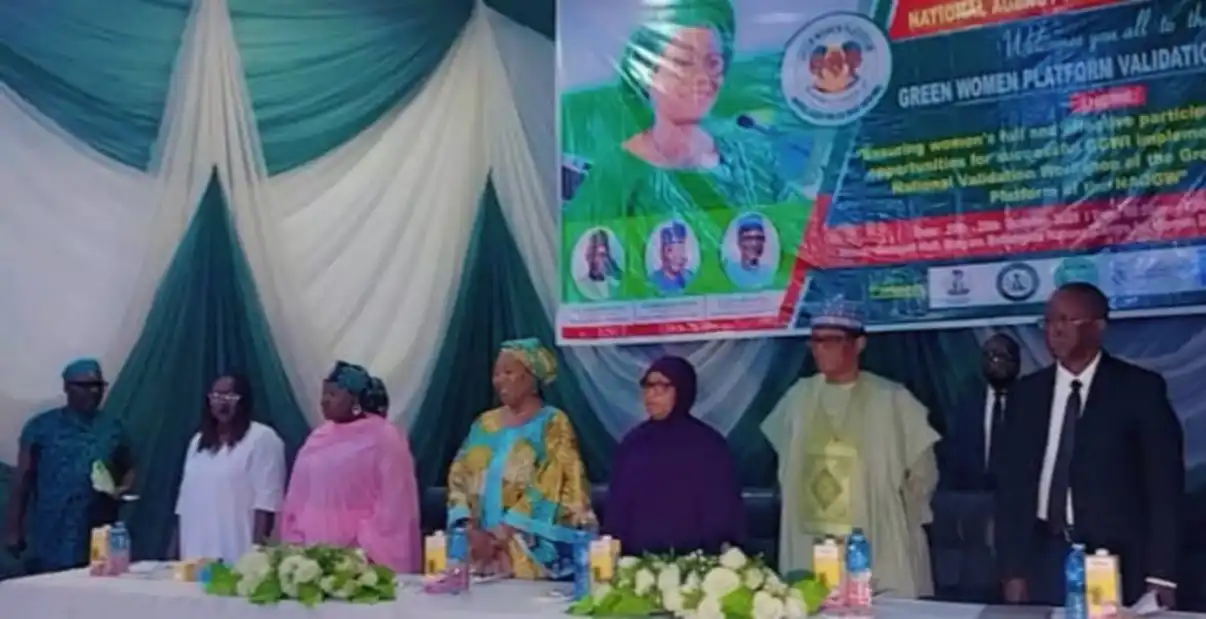The Federal Government has reaffirmed its commitment to placing Nigerian women at the forefront of climate action through the Green Women Platform (GWP).
Malam Balarabe Lawal, the Minister of Environment, said this at the Validation Workshop of the Green Women Platform held in Abuja on Tuesday.
The theme of the event was “Ensuring Women’s full and effective participation and equal opportunities for successful Great Green Wall Initiative implementation.”
The Green Women Platform is a flagship initiative designed to drive women-led environmental restoration, climate resilience, and sustainable livelihoods across the country.
Lawal, who was represented by Mrs Agnes Aneke, Director of Planning, Research and Statistics, said the platform would provide space for Nigerian women to take ownership of solutions affecting their lives, families, and communities.
“This moment is significant for Nigeria and the Pan-African Great Green Wall initiative, as we move from concept to action in ensuring that women are placed at the centre of environmental restoration, climate resilience, and sustainable development,” he said.
According to him, “Through this platform, women will not only have a voice in governance and decision-making around land use, natural resources, and climate action, but they will also gain access to economic opportunities in areas such as reforestation, renewable energy, sustainable agriculture, and green enterprises.
“It will also ensure that women remain the custodians of biodiversity and indigenous knowledge, passing on sustainable practices to future generations.”
The minister said Nigeria has consistently demonstrated leadership within the Great Green Wall initiative, from restoring degraded lands to promoting sustainable livelihoods.
He added that the programmes have been a model for replication across Africa and, equally important, the Green Women Platform connects strongly with the United Nations Sustainable Development Goals.
“It speaks to Goal 5 on gender equality by ensuring women’s full participation in environmental decision-making. It advances Goal 13 on climate action by mobilising women as leaders in adaptation and resilience,” Lawal said.
“By doing so, we are affirming that Nigerian women are not simply victims of climate change, but leaders of climate solutions. They are not passive beneficiaries, but innovators and decision-makers. They are not on the sidelines, but at the very centre of the Great Green Wall.”
Lawal stated that the Green Women Platform is a unique innovation of the Pan-African Great Green Wall designed to place women at the centre of the fight against desertification, climate change, land degradation, and the improvement of livelihoods.
Mr Mahmud Kambari, Permanent Secretary in the Ministry, said that women bear the most significant burden of environmental degradation, yet they are also the most potent agents of resilience and adaptation.
Kambari, who was represented by Aneke, said that by creating the Green Women Platform, Nigeria is aligning with the regional vision of the Pan-African Great Green Wall.
“This initiative demonstrates our collective resolve to mainstream gender equality into the Great Green Wall programme and ensure that women are not left behind in the implementation of our national environmental and climate commitments,” he said.
According to Kambari, “This workshop will validate the structural framework, adopt a national governance arrangement, and agree on a two-year action plan for the Green Women Platform. These outcomes will ensure that women are empowered as beneficiaries and full partners in decision-making, resource mobilisation, and implementation.”
Also speaking, Mr Almoustapha Garba, Executive Secretary of the Pan-African Agency of the Great Green Wall, commended the Federal Government of Nigeria for its efforts in implementing the Great Green Wall Initiative.
“The platform must, therefore, provide guidance, serve as an interface, and be a representative of the many women who do not have access to decision-making spheres in order to translate into reality and concrete actions,” Garba said.
He added that “It must serve as an observatory of women’s rights in the community and work to ensure their full and effective participation in local governance and access to natural resources.”
Mr Saleh Abubakar, the Director-General of the National Agency for the Great Green Wall (NAGGW), said that in Nigeria, women are not only custodians of the land but also agents of transformation within their communities.
“We may establish a strong and inclusive platform that empowers Nigerian women to build resilience, restore degraded lands, and foster sustainable livelihoods,” Abubakar said.

